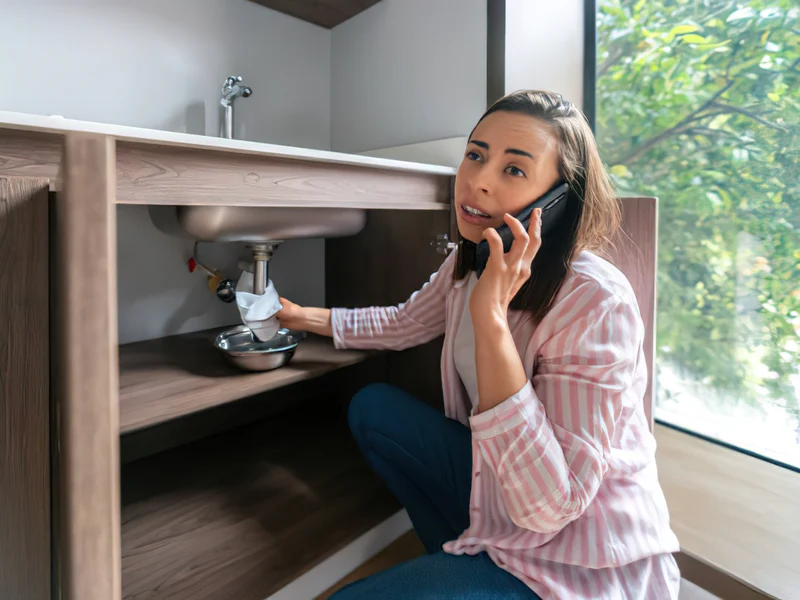Plumbing problems can be a major headache for homeowners. From clogged drains to leaking pipes, plumbing issues can cause significant disruption and damage in your home if not dealt with quickly and correctly.
Knowing when to fix a problem and when to call in an expert is essential for keeping your home safe and secure.
In this article, we’ll look at some of the most common plumbing problems, as well as how to identify them and decide whether you need professional help or if you’re able to tackle the issue on your own.
Identifying Common Plumbing Problems and Knowing When To Call A Professional
Knowing how to identify common plumbing issues is critical for recognizing when a problem is beyond your ability to fix. Here are some of the most common plumbing problems and tips on when you should call an expert plumber:
Pipe Leaks and Bursts
One of the most common plumbing problems homeowners face is pipe leaks and bursts. Leaking pipes can cause water damage to your property and result in high water bills.
Additionally, a burst pipe can lead to significant flooding and further damage. Identifying the signs of a leaking pipe, such as dampness or water stains on walls, ceilings, or floors, can help you address the issue promptly.
If you suspect a pipe leak, shutting off the water supply before attempting any repairs is crucial. If the leak is minor, you may be able to fix it yourself with supplies from your local hardware store. However, for more significant leaks and burst pipes, it’s best to call a professional plumber who can assess the issue and provide a permanent solution.
Clogged Drains and Toilets
Another common plumbing issue is clogged drains. If your sink, shower, or toilet isn’t draining correctly, you may be dealing with a buildup of hair, soap scum, or grease that needs to be cleared out. Sometimes, the clog is located near the top of the drainpipe, which can often be cleared with a plunger or an auger. However, if the clog is deeper in the pipes, you may need to call in professional help.
If your drains are still clogged after attempting DIY solutions, it’s time to call a qualified plumber. Plumbers have access to specialized tools that can locate and remove clogs deep in the pipes and inspect them to look for any underlying issues.
Low Water Pressure
Low water pressure is another common plumbing issue that may not seem urgent but can be highly irritating. Low water pressure reduces your ability to shower or wash dishes efficiently, and it can indicate a more serious issue.
If your water pressure is low, one of the first things you should check is whether the aerator on your faucet is clogged. If that isn’t the cause of the problem, you’ll likely need to call a professional plumber for help. Low water pressure could be due to corrosion in your pipes, a leak, or a blockage.
A qualified plumber will be able to identify the cause of the issue and provide an effective solution.
Water Heater Issues
Malfunctioning water heaters can disrupt your daily routine. Common problems include inadequate hot water, strange noises, or leaking tanks. Regular maintenance and timely repairs are crucial for extending the lifespan of your water heater.
If you encounter any issues with your water heater, it’s best to consult a professional plumber to ensure safe and efficient operation.
How to Avoid Plumbing Issues
A plumbing system that works properly is essential for keeping your home comfortable and functional. But even with regular maintenance, some unavoidable issues can crop up occasionally. Fortunately, you can take steps to avoid or minimize the impact of these problems, such as preventative measures, proper disposal of waste, and protecting pipes during winter months.
In this section, we’ll look at how to implement these strategies so you can keep your plumbing system in tip-top shape.
Preventive Measures
To minimize plumbing problems, it’s essential to adopt preventive measures. These include regularly inspecting your pipes and fixtures, avoiding harsh chemicals damaging your plumbing system, and practicing good water conservation habits. Additionally, you should be mindful of what goes into your drains to avoid blockages.
Proper Disposal of Waste
It’s also essential to practice proper waste disposal when it comes to maintaining a healthy plumbing system. Anything that isn’t biodegradable, such as coffee grounds, cooking oil, and other debris, should not go down the drain.
You should also avoid putting food waste into your toilet or sink drains. Instead, you should dispose of it in a compost bin or elsewhere.
Protecting Pipes During Winter Months
Finally, protecting your pipes from freezing temperatures is essential in winter. This involves insulating hot and cold water lines to help maintain a consistent temperature throughout the system.
You should also ensure that any exposed pipes are protected from drafts and that all overflow drains work correctly.
Following these tips can minimize the risk of plumbing issues and ensure your home is comfortable and functional for years. Regular maintenance by a qualified professional plumber can also help keep your system functioning optimally and catch any potential problems before they become serious.
Plumbing emergencies can be disruptive and intimidating, but with the right help, they don’t have to be.
At Zachary Plumbing, we provide fast and reliable plumbing services for all issues, from clogged drains to major repairs.
Our experienced team is equipped with the latest tools and technology to inspect your pipes and identify the cause of any issue quickly and accurately. Let us help you get your plumbing system running like new again!
Contact us today for more information about our services.
Frequently Asked Questions
Here are some of the most common questions we get asked about plumbing issues:
If you have a leaking pipe, turn off the main water supply, and contact a professional plumber immediately. They will assess the situation and repair it to prevent further damage.
It is recommended to schedule plumbing maintenance at least once a year. However, older properties or those with specific plumbing issues may require more frequent inspections and maintenance.
While chemical cleaners can effectively unclog drains, they should be used sparingly. Overuse of chemical cleaners can damage pipes and harm the environment. It’s best to rely on non-chemical methods or seek professional help for persistent clogs.
Signs of a faulty water heater include inadequate hot water, strange noises, foul odors, water leaks, or inconsistent water temperature. If you notice any of these signs, it’s advisable to consult a professional plumber for an inspection.
The duration of plumbing repairs depends on the complexity of the issue. Minor repairs can be completed within a few hours, while significant problems may require multiple visits or extensive work. A professional plumber can provide a more accurate estimate after assessing the situation.

